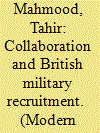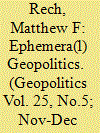| Srl | Item |
| 1 |
ID:
146836


|
|
|
|
|
| Summary/Abstract |
This article examines the ways in which rural elite collaborators mobilized recruits for the British Army during the First World War. It thus not only increases knowledge of Punjab's military history, but adds to the understanding of collaboration as a process involving competitive groups in which elites manipulated the process for their own ends. The case study material drawn from the Shahpur district of the colonial Punjab argues that while there may have been a degree of indoctrination into the colonial state's values, it was mainly the desire to use its patronage to bolster family influence or to transform local hierarchies that was the key factor in securing willing collaborators. The competition for local power and influence provided a local dynamic to the collaborative process. The state could of course take advantage of this competition to serve its interests, just as the Punjabi tribal chiefs could utilize state patronage to beat off rivals to their power. Collaboration was thus a dynamic two-way process, rather than, as it is often portrayed, a top-down, one-way relationship.
|
|
|
|
|
|
|
|
|
|
|
|
|
|
|
|
| 2 |
ID:
175325


|
|
|
|
|
| Summary/Abstract |
This paper explores contemporary cultures of British military recruitment and considers the domestication of geopolitics as matters of the ephemeral (fleeting, sensory encounters), and of ephemera (everyday objects). It employs an auto/ethnographic approach toward spaces critical to recruitment – the airshow, the home and the body. Three central contributions are developed: first, building on a recent turn to the material in political geography, the paper argues that taking seriously materiality, objects, and ‘stuff’ enhances our understanding of the connections between geopolitical, militarised and everyday; second, deploying a notion of the geopolitical social, it explores the geopolitical as it is situated in everyday lives and spaces; third, it investigates the tendency for militarised objects to find their way onto and around bodies and into domestic spaces. Set at the interface of literatures in critical geopolitics and critical military studies, the paper concludes that material encounters and everyday objects are matters central to the business of geopolitics and militarism.
|
|
|
|
|
|
|
|
|
|
|
|
|
|
|
|